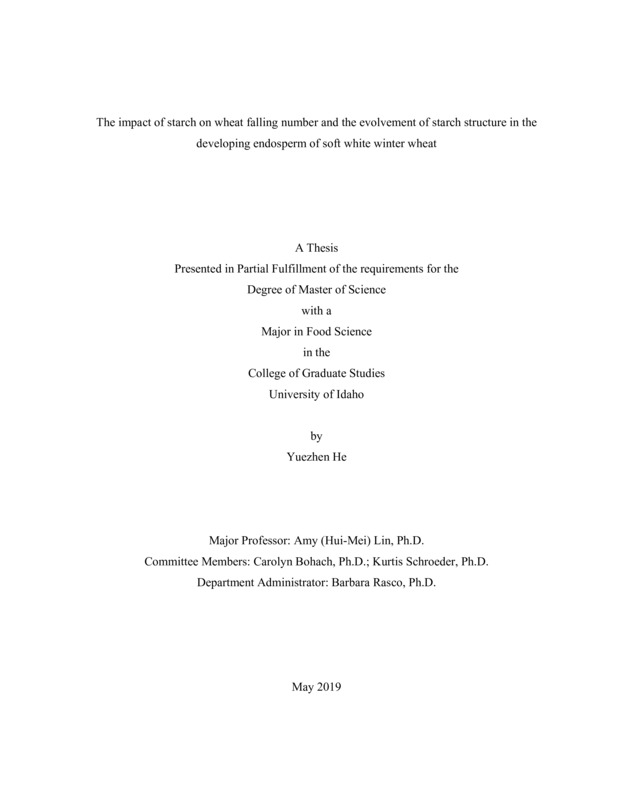The impact of starch on wheat falling number and the evolvement of starch structure in the developing endosperm of soft white winter wheat
He, Yuezhen. (2019-05). The impact of starch on wheat falling number and the evolvement of starch structure in the developing endosperm of soft white winter wheat. Theses and Dissertations Collection, University of Idaho Library Digital Collections. https://www.lib.uidaho.edu/digital/etd/items/he_idaho_0089n_11566.html
- Title:
- The impact of starch on wheat falling number and the evolvement of starch structure in the developing endosperm of soft white winter wheat
- Author:
- He, Yuezhen
- Date:
- 2019-05
- Embargo Remove Date:
- 2021-07-10
- Keywords:
- Falling number Starch Wheat
- Program:
- Food Science
- Subject Category:
- Food science
- Abstract:
-
The United States Pacific Northwest is known to produce premium soft white wheat with consistent quality; however, the unexpected low falling number issue resulted in a $30 million and $140 million loss in 2014 and 2016, respectively. Wheat with a low falling number is considered poor-quality due to the elevation of α-amylase activity, which leads to a quick liquefaction of starch and decreases flour paste viscosity. The primary causes of low falling number are pre-harvest sprouting and late maturity α-amylase, both triggered by unusual weather pattern (e.g. pre-harvest rain and temperature shock). We hypothesize that weather impacts starch structural development and influences starch functionality (e.g., viscosity). Our previous study supports this hypothesis and reveals a starch developmental change in some low falling number wheat. To identify a solution for the low falling number issue, we conducted a comprehensive review (Chapter 1) regarding the impact of starch and its interaction with other molecules on wheat falling number, which lead to another hypothesis that plant growing conditions play an important role in influencing starch structure evolvement. However, it was difficult to directly identify how environmental stress triggers the starch structural changes because it is not known how starch structure evolves during grain development in soft white wheat. Thus, we conducted a study to close this knowledge gap, and we investigated the evolvement of starch structure in developing kernels (Chapter 2). We systematically measured starch structural characteristics, including starch content, starch granule size distribution, the ratio of amylose to amylopectin, the development in the structure of amylopectin, and starch gelatinization temperature and enthalpy change. We divided the development of starch structure into three stages: the initial stage (Day 7 to Day 10 after anthesis), rapid accumulation stage (Day 14 to Day 28 after anthesis), and the maturity stage (Day 35 to Day 42 after anthesis). During the rapid accumulation stage, starch quantity increased rapidly, starch granule size distribution became a bimodal distribution, and starch crystalline structure gradually became more organized. After the plant reached physiological maturity (Day 35 after anthesis), starch structure continued developing during the starch maturity stage. Our findings suggest that when environmental stress occurs during the rapid accumulation stage, it can critically change starch structure and impact starch functionality. Future work to identify the genetic controls of the development of starch structure during the rapid accumulation stage will be helpful to develop a new wheat variety with a high resistance to weather changes and may help solve the low falling number issue.
- Description:
- masters, M.S., Food Science -- University of Idaho - College of Graduate Studies, 2019-05
- Major Professor:
- Lin, Amy (Hui-Mei)
- Committee:
- Bohach, Carolyn; Schroeder, Kurtis
- Defense Date:
- 2019-05
- Identifier:
- He_idaho_0089N_11566
- Type:
- Text
- Format Original:
- Format:
- application/pdf
- Rights:
- In Copyright - Educational Use Permitted. For more information, please contact University of Idaho Library Special Collections and Archives Department at libspec@uidaho.edu.
- Standardized Rights:
- http://rightsstatements.org/vocab/InC-EDU/1.0/

